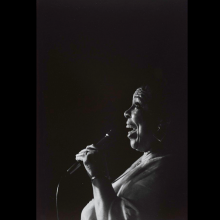
Sid Gribetz presents a five hour radio broadcast honoring vocalist Helen Humes on "Jazz Profiles" this Sunday August 7, 2022 from 2-7 PM on WKCR.
When Billie Holiday left the original Count Basie orchestra in 1938, how could she be replaced, and who could replace her? The musical answer is the incomparable Helen Humes, a major figure in her day but long overlooked.
Helen was born in Louisville, Kentucky June 23, 1909 (a date sometimes made younger in press releases and reference books) to a middle class black family, her father a lawyer, just a generation removed from slavery. As a teenager, she already made her name singing in the classic 1920's blues style and waxed popular records for OKeh. After working in banks and law offices, Helen spread her wings and sang with Al Sears in Buffalo, and on the road, where she came to the attention of Basie. For several years in the late 1930's and early 1940's, Helen was the featured female vocalist in the Basie band, sharing the microphone with blues shouter Jimmy Rushing.
Helen sang with a fresh and girlish timbre that was playful and endearing, yet she also conveyed the wizened and worldly wise emotions of the blues and popular song book, that enabled her to fill Billie’s shoes.
After leaving Basie, Helen established herself in the post war years in Los Angeles as a popular attraction, recording with old jazz friends such as Buck Clayton, Lester Young and Benny Carter. More notably, she became a dynamic star in the burgeoning rhythm and blues field with hits such as “E-Baba-Leba”, “Million Dollar Secret” and “They Raided The Joint”.
In the late 1950's, Helen toured Australia with Red Norvo. Upon returning stateside Humes made some stunning recordings of classic standards with the Contemporary label that gave her some acclaim. However, she then retired for many years to care for her elderly parents back in Louisville.
Humes made a startling comeback when Stanley Dance presented her at the Newport Jazz Festival in 1973. Concert appearances in Europe, new record contracts, and engagements with Barney Josephson at The Cookery in Greenwich Village gave that rarest accomplishment, a second act in American arts. Helen died in 1981.
